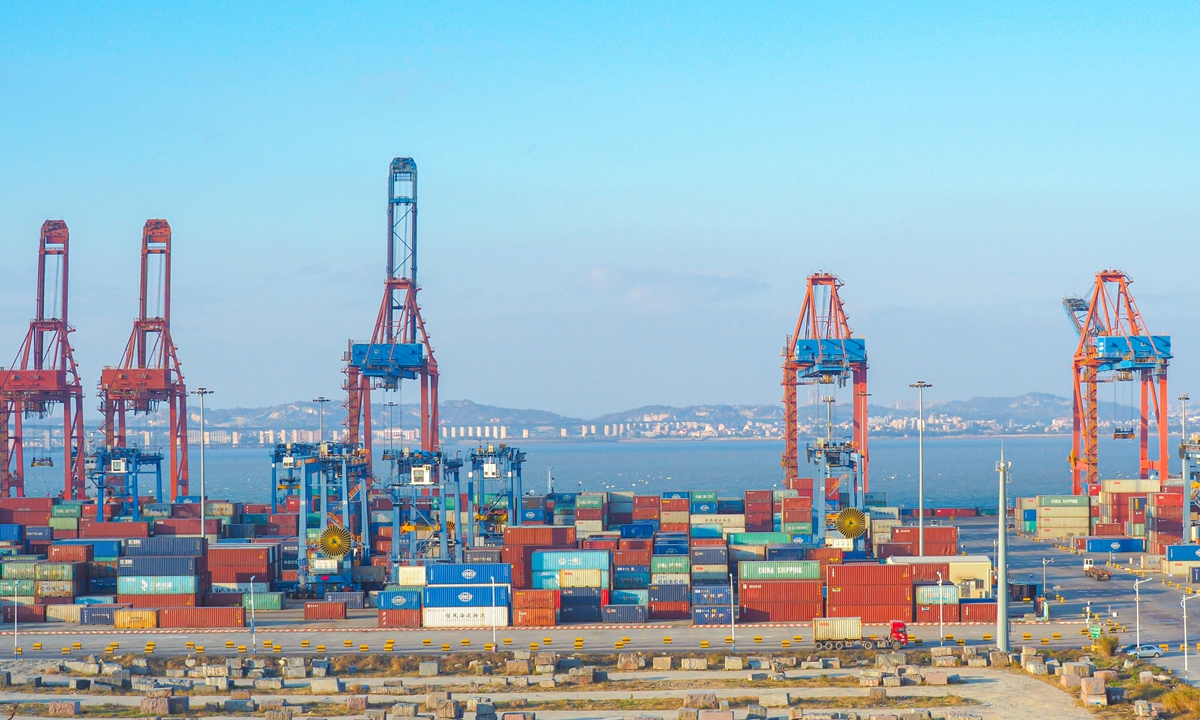
A view of Shihu Port in Quanzhou, East China's Fujian Province Photo: VCG
China's Ministry of Commerce (MOFCOM) announced on Monday that the China-Singapore Free Trade Agreement (FTA) Further Upgrade Protocol will come into effect on Tuesday.
Also on Monday, Wang Wentao, China's Commerce Minister, held a video conference with Mohamed Saeed, Minister for Economic Development and Trade of the Maldives, and the two sides announced that the China-Maldives FTA will take effect on Wednesday.
The China-Singapore FTA Further Upgrade Protocol, in line with high-standard international economic and trade rules, will further open up the services trade and investment markets between China and Singapore, the MOFCOM said in a statement.
In terms of market access, China and Singapore made commitments on opening up services and investment in a negative list mode. This is the first time that China has completed the negotiation of upgrading an FTA with a negative list, according to the ministry.
With regard to rules, under the protocol, the two sides have established high-standard institutional arrangements in areas such as trade in services, investment, and telecommunications services, and further expanded cooperation in emerging areas such as the digital economy.
"The entry into force of the Protocol will further stimulate the potential of service trade and investment cooperation between the two countries, and continuously enrich the development of the all-round, high-quality and forward-looking partnership between China and Singapore," the statement said.
For its part, Singapore's Ministry of Trade and Industry said in a statement on Monday that "Singapore businesses will benefit from greater market access to China through a 'negative list' approach, where by default, all sectors are opened to investors except for those specifically listed."
China and Singapore first signed an FTA in October 2008, and upgraded the FTA in 2011 and 2018. In December 2023, the two sides signed the Protocol. China has remained Singapore's largest trading partner for 11 consecutive years, and Singapore is the second largest source of foreign investment for China and the largest destination for Chinese outbound investment, according to the MOFCOM.
Zhou Shixin, director of the Institute for Foreign Policy Studies at the Shanghai Institute for International Studies, pointed out that the upgraded FTA between China and Singapore can be seen as a bellwether of regional free trade, as Singapore has a relatively high-standard system and mechanism for economic cooperation in the region.
"The upgrading of the China-Singapore FTA further highlighted China's high-standard trade system, which will facilitate China's participation in more regional trade agreements such as the Comprehensive and Progressive Agreement for Trans-Pacific Partnership," Zhou told the Global Times on Monday.
Meanwhile, once the China-Maldives FTA takes effect, most of China's exports to the Maldives such as ships, electrical equipment, furniture, and agricultural products will benefit. While most of the aquatic products originating from the Maldives will also enjoy zero-tariff treatment when exported to China, the MOFCOM said in a statement.
"The entry into force and implementation of the FTA will provide a solid institutional guarantee for enhancing the level of trade and investment liberalization and facilitation between the two countries, effectively promoting greater development in bilateral economic and trade relations, and continuously improving the well-being of the enterprises and people of both nations," the statement said.
Xu Liping, director of the Center for Southeast Asian Studies at the Chinese Academy of Social Sciences, said that the China-Maldives FTA further underscored China's commitment to expanding opening-up toward the Global South and to promoting open, free global trade.
"As global trade is overshadowed by the rise of protectionism, upgraded and new FTAs between China and other countries underscored China's firm commitment on promoting global free trade," Xu told the Global Times on Monday, adding that these agreements will inject more vitality into the nation's foreign trade in the coming year.




